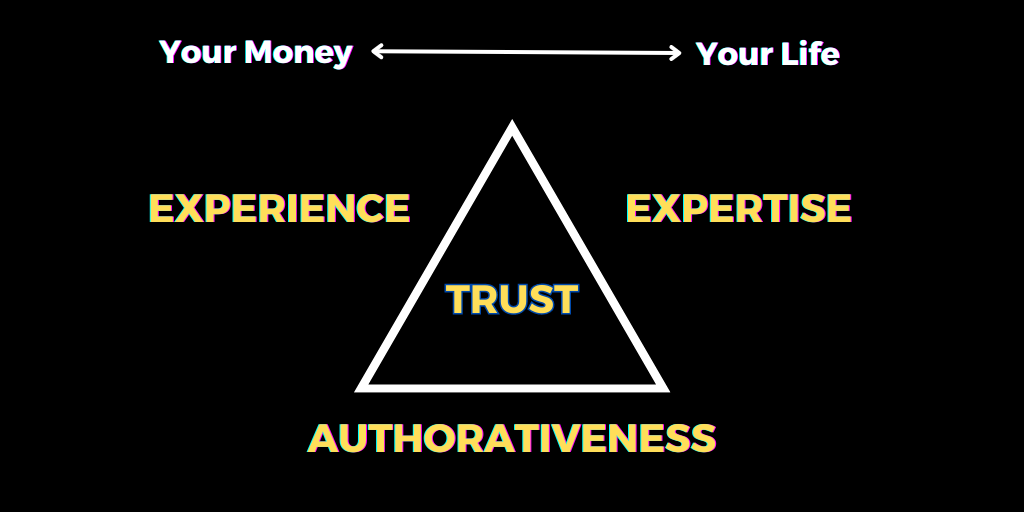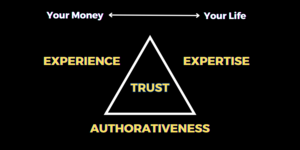Introduction
Your clients come to you during some of life’s most vulnerable moments—navigating a divorce, planning their estate, or facing bankruptcy. In these situations, trust isn’t just important; it’s everything. Yet in 2025, building that credibility begins long before someone walks through your office door. It starts the moment they find your website online.
Here’s the reality: it’s no longer enough for your law firm to simply have a website. Your digital presence must genuinely reflect the expertise, care, and trustworthiness that define your practice. This is where Google’s EEAT framework and YMYL standards become your allies, not obstacles.
These two evaluation models—Experience, Expertise, Authoritativeness, and Trustworthiness (EEAT) and Your Money or Your Life (YMYL)—aren’t just technical requirements. They’re Google’s way of ensuring that when someone searches for legal help during a crisis, they find attorneys who can truly serve them well.
In this post, we’ll explore how Google evaluates law firm websites in 2025 and share four essential steps to help your practice stand out as the trusted, credible, and authoritative resource your community needs.
Understanding EEAT: More Than Just a Google Requirement
EEAT represents the qualities your clients are already seeking when they choose you:
- Experience: Do you understand what your clients are truly going through?
- Expertise: Can you navigate the complex legal landscape they’re facing?
- Authoritativeness: Do your peers and community recognize your capabilities?
- Trustworthiness: Will you guide them safely through their legal journey?
What makes 2025 different is that Google’s algorithms have become remarkably sophisticated at recognizing these human qualities online. As AI-generated content floods the internet, search engines are placing even greater value on authentic, experience-driven insights from real practitioners like you.
"Trust arrives on foot but leaves on horseback."
Dutch Proverb Tweet
This shift actually works in your favor. While others chase algorithmic tricks, you can focus on what you already do best: demonstrating genuine expertise and building meaningful relationships with the people you serve.

Why YMYL Matters for Your Practice
YMYL stands for “Your Money or Your Life”—and if you’ve ever helped a family through estate planning or guided someone through a difficult divorce, you understand exactly why this designation matters.
Google uses YMYL to identify content that can significantly impact someone’s:
- Financial security
- Family relationships
- Legal rights
- Overall well-being
Your practice area inherently falls under this category, which means Google holds your content to higher standards. But rather than seeing this as a burden, consider it validation of what you already know: the work you do matters deeply, and the information you share can genuinely change lives.
When Google applies stricter criteria to legal websites, it’s protecting the same vulnerable people you serve every day. By aligning with these standards, you’re not only improving your search rankings—you’re also reinforcing your commitment to responsible and ethical practice.
How Google Evaluates Your Practice in 2025
The landscape has evolved significantly, and Google now evaluates your firm’s credibility across multiple touchpoints. Understanding these changes helps you meet potential clients wherever they’re searching for help.
Organic Search Results
Law firms that demonstrate strong EEAT consistently see remarkable results:
- Higher visibility in both local and national searches
- 40–60% more organic traffic growth compared to competitors
- Increased presence in “People Also Ask” sections and featured snippets
This isn’t about gaming the system—it’s about authentically representing your expertise in ways that both search engines and potential clients can recognize and trust.

AI-Powered Search Tools
Your future clients are increasingly turning to AI assistants like ChatGPT, Gemini, and Perplexity for initial legal guidance. These tools now actively source their answers from websites that demonstrate clear EEAT signals.
When you publish content with named authors, detailed credentials, and transparent sourcing, you increase the likelihood that these AI tools will reference your expertise when someone asks about estate planning or family law questions.
“AI doesn’t trust what you say about yourself. It trusts what others confirm.”
Google's Search Quality Evaluator Guidelines (paraphrased) Tweet
Practical Tip: This is why updating your attorney bios with current bar memberships and adding clear authorship to your articles isn’t just good practice—it’s becoming essential for digital visibility.
For more specifics on how to improve your Attorney Bios, check out this post (How We Fixed An Attorney Bio Page By Adding One Line Of Human StoryTelling).
Social Media and Professional Networks
While social platforms don’t use Google’s exact EEAT algorithm, they’ve developed similar systems that prioritize trustworthy, credible content:
- Posts linking to well-established, authoritative websites receive more engagement
- Content from verified professionals gets shared 2–4x more frequently in legal communities and professional networks
This creates a positive cycle: strong EEAT signals improve your search visibility, which enhances your social media credibility, which drives more referrals back to your practice.

The 4 Essential Changes for 2025
Based on these evolving standards, here are four strategic adjustments that will help your practice thrive in the current digital landscape:
"Your online presence is now your first consultation—make it count."
Unattributed from FaceBook Tweet
Share Your Story with Authentic Experience
Your clients don’t just want to know your credentials—they want to understand that you’ve walked alongside others facing similar challenges.
Instead of generic attorney bios, help potential clients see:
- The specific situations you’ve navigated and lessons you’ve learned
- How your approach has evolved through years of practice
- The genuine care and attention you bring to each case
Action step: Create a “How We Help” section that shares real insights (while maintaining client confidentiality) about your approach to common challenges in your practice area.
Deepen Your Expertise Through Strategic Focus
Rather than trying to be everything to everyone, consider the power of becoming known as the go-to expert in your specific niche. This focused approach allows you to:
- Develop deeper insights that truly serve your clients
- Build stronger referral relationships with complementary practices
- Create content that resonates more powerfully with your ideal clients
Action step: Audit your current content strategy to ensure 80% focuses on your core services, with 20% exploring closely related areas where you can add unique value.
Build Community Recognition and Professional Authority
True authority isn’t self-proclaimed—it’s recognized by others. This means actively participating in your professional and local communities:
- Contributing to legal publications and industry discussions
- Partnering with community organizations that serve your clients
- Earning recognition from peers and professional associations
Action step: Identify 1–2 community organizations or nonprofit legal clinics where you can contribute meaningfully, creating natural opportunities for professional recognition and citations.
Embed Trust Throughout Your Digital Presence
Trust is built through countless small details that, collectively, create confidence in your professionalism:
- Secure, well-designed websites with clear contact information
- Genuine testimonials and case results (where appropriate)
- Professional photography and current, accurate information
- Transparent communication about your process and approach
Action step: Conduct a “trust audit” of your website, ensuring every page includes relevant social proof and clear pathways for potential clients to connect with you.
Tools to Support Your Success
While human expertise remains irreplaceable, these AI tools can help you communicate more effectively:
- ChatGPT: Useful for brainstorming content ideas and repurposing long-form articles into social media posts
- Claude: Excellent for organizing complex legal concepts into clear, client-friendly explanations
- Gemini: Helpful for refining tone and ensuring your content reads naturally while maintaining professionalism
Important Tip: These tools support your expertise—they don’t replace it. Always review and personalize any AI-generated content to ensure it reflects your authentic voice and meets your professional standards.
For help in improving your prompt skills, check out this post on Structured Directive Enforcement (SDE) and Structured Layout Engineering (SLE). Get the most value out of your tools and the time you spend on them!
Moving Forward with Confidence
The digital landscape continues to evolve, but the fundamentals remain constant: people seeking legal help want to find attorneys who combine genuine expertise with trustworthy, compassionate service. Google’s EEAT and YMYL standards simply help ensure that when someone needs your help, they can find you.
This isn’t about manipulation or shortcuts—it’s about authentically representing the valuable work you already do. When you demonstrate real experience, publish clear and helpful content, and earn recognition within your community, you’re not just improving your search rankings. You’re building a practice that truly serves the people who need your help most.
“If you’re not controlling your digital narrative, someone else is.”
Unknown Tweet
Your Next Steps: Building on Your Strengths
You don’t need to overhaul everything at once. Start with these foundational improvements:
✅ Update your attorney profiles with current credentials and personal insights about your approach
✅ Commit to one in-depth article per month that addresses real questions from your practice area
✅ Strengthen your professional network through legal directories and community involvement
✅ Gather and showcase client testimonials that reflect the impact of your work
✅ Audit your website to ensure it feels secure, professional, and welcoming
Each of these steps builds on the expertise and dedication you already bring to your practice. You’re not starting from scratch—you’re simply ensuring that your digital presence reflects the quality and care that defines your work.
Suppose you’d like guidance on implementing these strategies for your specific practice. In that case,Sirus Digital specializes in helping law firms build genuine authority, generate sustainable leads, and create digital presences that clients trust. We understand the unique challenges facing estate planning, family law, and elder law practices, and we’re here to help you navigate this evolving landscape with confidence.
Feel free to connect with me on LinkedIn or in the Comments below.
Further Reading on Google’s Guidelines
Go Deeper
Check out this four-part series from Sirus Digital designed to help legacy-minded law firms build a trusted online presence by aligning with Google’s EEAT (Experience, Expertise, Authoritativeness, and Trustworthiness) and YMYL (Your Money, Your Life) standards.
- The Digital Credibility Framework Every Law Firm Must Understand in 2025
Understand the fundamentals of EEAT and YMYL and why they matter more than ever for legal professionals. - Credibility Is the New Currency: Building a Legal Website That Converts and Ranks
Explore the website signals that influence both search engines and prospective clients—and how to get them right. - What You Must Change on Your Website Right Now
A practical guide to the most common law firm website mistakes—and how to correct them fast. - Smarter Law Firm Marketing: Tools That Build Trust and Free Your Time
Discover tools and techniques that elevate your digital presence while giving you back time for client work.
Each post breaks down key concepts into clear, actionable insights that help attorneys increase visibility, attract better-fit clients, and establish long-term digital credibility. Whether you’re rebuilding your website or refining your digital strategy, these posts give you the tools to build trust without wasting time or burning out.



